#Terence Macartney-Filgate
Text
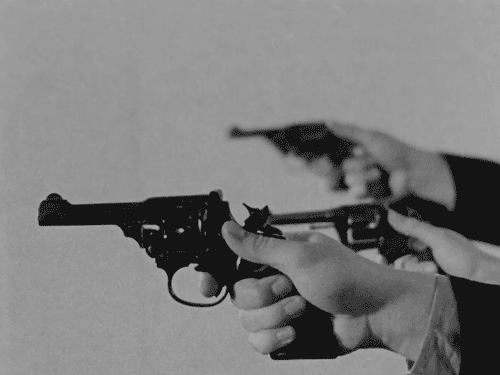
Police, 1958
24 notes
·
View notes
Photo




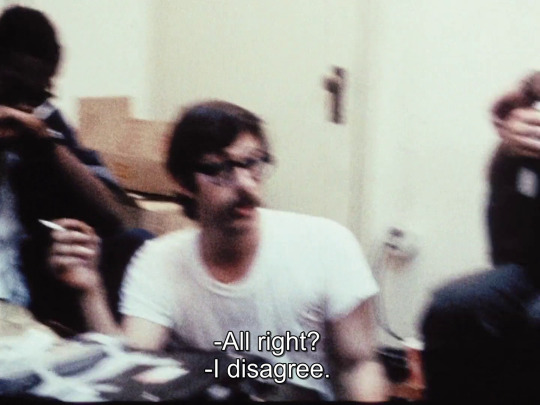
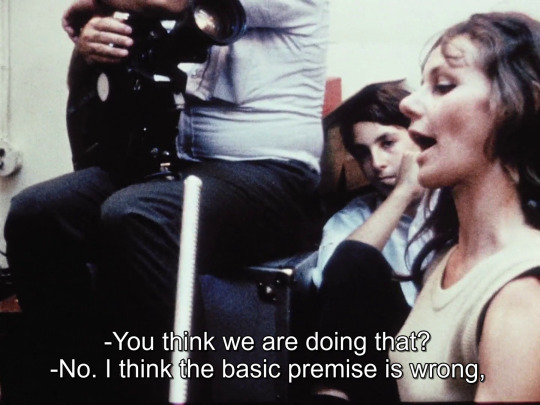




Symbiopsychotaxiplasm: Take One (William Greaves, 1968).
#symbiopsychotaxiplasm: take one#symbiopsychotaxiplasm: take one (1968)#william greaves#stevan larner#terence macartney-filgate
34 notes
·
View notes
Text
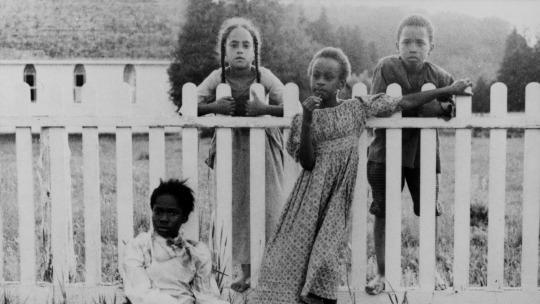
Fields of Endless Day (1978)
[letterboxd | imdb]
Archive: National Film Board of Canada
Director: Terence Macartney-Filgate
Cinematographers: Dennis Mills, Ron Watts
Performers: Lili Clark, Winston Sutton, Ricardo Keens-Douglas, Mireille Métellus, Jodi Drake, Luther Hansraj, Tracy Connell
Languages: English
Music: Sound film
Runtime: 58 min.
#NFB#nfb/onf#1970s#1978#sound film#Canada#english#30-60#Terence Macartney-Filgate#independent film#cinema#film#history#history film
0 notes
Photo
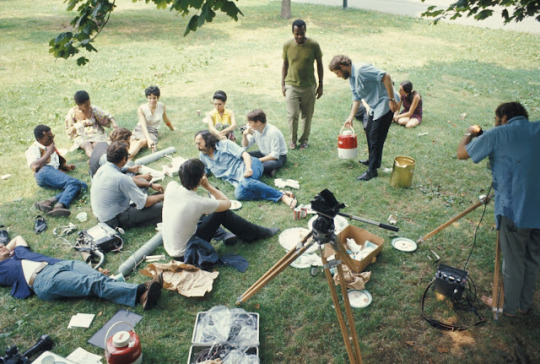
Symbiopsychotaxiplasm: Take One (William Greaves, 1968)
Cast: Patricia Ree Gilbert, Don Fellows, Jonathan Gordon, Bob Rosen, William Greaves, Susan Anspach, Audrey Henigham, Stevan Larner, Terence Macartney-Filgate, Maria Zeheri. Screenplay: William Greaves. Cinematography: Stevan Larner, Terence Macartney-Filgate. Film editing: William Greaves. Music: Miles Davis.
Most of the experimental filmmaking that flourished in the late 1960s and early 1970s is forgotten and even unwatchable today. But one film that has endured, even though it went mostly unseen until the 1990s, is William Greaves's Symbiopsychotaxiplasm: Take One, which is a movie about making a movie -- and maybe even a movie about making a movie about making a movie. It's that intricate a concept. It may sound banal: Filmmaker Greaves assembles a crew of actors, sound techs, cameramen, and others, to make a movie that may or may not be called Over the Cliff, in Central Park. But he also hires a crew to film the filming, and himself carries a camera that he uses to capture whatever strikes his fancy at the moment. The ostensible movie is about a couple in the midst of a breakup, and we see a couple of tests of actors for the roles, among them Susan Anspach, who would go on to have a notable career in movies. He seems to decide on Patricia Ree Gilbert for the role of Alice and Don Fellows for Freddy, and we see a crucial moment in their breakup, when Alice berates Freddy for making her have a series of abortions and then accuses him of being a closeted homosexual. But Greaves, the director, doesn't seem to know quite which way to go with the performances and the story, to the consternation of the crew, whom we see griping about his direction. And that's about it, except for a concluding scene in which the crew encounters a homeless, alcoholic intellectual who delivers his semi-coherent thoughts about the state of the world. Describing Symbiopsychotaxiplasm does indeed reduce it to absurdity. But it has a way of drawing you into the apparent incoherence of the situation, of making you realize that film is a collaborative art that needs a central consciousness to succeed. You may even wonder if Greaves is as big a fool as some of his crew seem to think he is. He wasn't, of course -- he's cannily playing a role. He was an important documentarian who started as an actor, trained at the Actors Studio, and went on to produce the National Educational Television series Black Journal, as well as major films about the Black experience. When he failed to get funding for the theatrical release of Symbiopsychotaxiplasm, he shelved it. Eventually, after some prominent people, such as Steve Buscemi and Steven Soderbergh, discovered it at the Sundance Film Festival in 1992, it got the audience it deserved, and in 2015 was added to the National Film Registry of the Library of Congress.
4 notes
·
View notes
Text
Terence Macartney-Filgate, Pioneer Cinema Verite Doc Maker, Dies at 97 – The Hollywood Reporter
Terence Macartney-Filgate, Pioneer Cinema Verite Doc Maker, Dies at 97 – The Hollywood Reporter
Terence Macartney-Filgate, a pioneering documentary maker and cinematographer who helped develop an unscripted, observational style of filmmaking common in reality TV today, has died. He was 97.
Macartney-Filgate died Monday in Toronto. No cause of death was available.
Over a 60-year career, he was a longtime collaborator with the National Film Board of Canada and directed his first film for the…
View On WordPress
0 notes
Photo

Symbiopsychotaxiplasm: Take One (1968)
#1960s#actor bill greaves#dir william greaves#dp stevan larner#dp terence macartney filgate#cat documentary#cat avant garde#american#green#hands#brown eyes#symbiopsychotaxiplasm take one
2 notes
·
View notes
Video
youtube
Today's review on MyOldAddiction.com, Symbiopsychotaxiplasm: Take One by #WilliamGreaves, "vibrant and funny and thought-provoking all at once" WILLIAM GREAVES Bil's rating (out of 5): BBBB. USA, 1968. Take One Productions.
#Bob Rosen#Criterion Collection#Don Fellows#Jonathan Gordon#Miles Davis#Patricia Ree Gilbert#Stevan Larner#Take One Productions#Terence Macartney-Filgate#William Greaves
0 notes
Photo
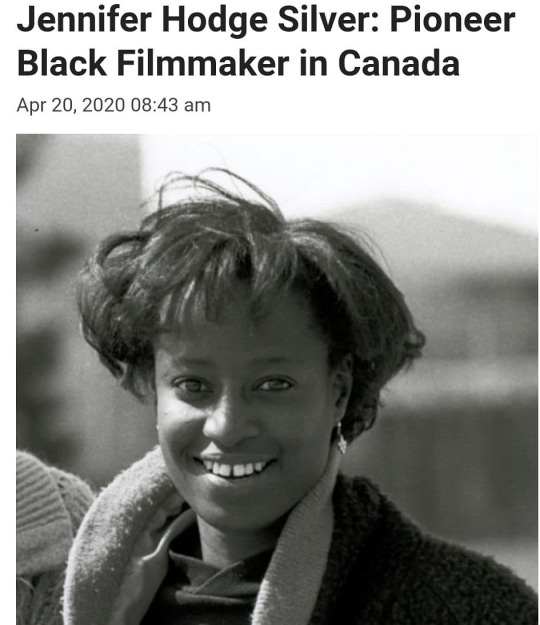
Jennifer Hodge de Silva was a pioneering African-Canadian filmmaker of the 1970s and 1980s. She was the first Black filmmaker to work consistently with both the National Film Board (NFB) and the CBC. She produced an acclaimed and influential body of work known as realist social-issue documentary. Her highly regarded film Home Feeling: A Struggle for Community (1983) is widely taught in post-secondary film studies programs throughout Canada. The daughter of a broadcaster, civil servant, diplomat, and best-selling author Mairuth Hodge Sarsfield. Hodge was exposed to arts and culture throughout her childhood. She completed her secondary school education at the École d’Humanité in Hasliberg-Goldern, Switzerland, which resulted in a cosmopolitan perspective on the world, as well as becoming fluent in French and German, and proficient in Italian. She later returned to Canada to attend Glendon College at York University in Toronto, where she earned a Bachelor of Arts in Fine Arts in 1974. She then apprenticed at the National Film Board in Montréal before returning to Toronto to attend Ryerson Polytechnic Institute (now Ryerson University), where she received a Bachelor of Applied Television Arts in 1979. That year, she also directed the NFB short film Canada Vignettes: Helen Law, a portrait of a Chinese immigrant and her first-generation Canadian son. While still a student, Hodge served as assistant director and associate producer on the film Fields of Endless Day (1978), one of the first Canadian productions to significantly chronicle nearly 400 years in the history of African Canadians. The film was directed by Terence Macartney-Filgate, with whom she worked — as associate producer — on the CBC TV production Dieppe 1942 (1979). Hodge de Silva’s signature film, Home Feeling: Struggle for a Community (1983), explored the troubled relations between the Toronto Police Service and residents of the city’s predominantly Black Jane-Finch district. Hodge de Silva died of cancer at age 38. https://www.instagram.com/p/B_QJf3MpC-_/?igshid=11v2nzks1beoh
0 notes
Photo

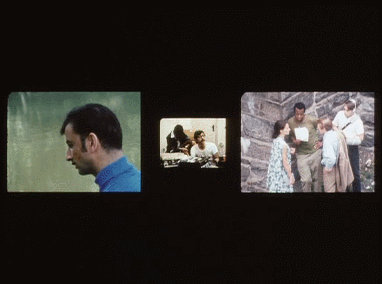

Symbiopsychotaxiplasm: Take One
1968
Director: William Greaves
Cinematographer: Stevan Larner, Terence Macartney-Filgate
#Symbiopsychotaxiplasm#Symbiopsychotaxiplasm: Take One#Symbiopsychotaxiplasm Take One#William Greaves#film#film gif#gif#movie#cinema#cinematography#experimental film#see this movie#cinephile
107 notes
·
View notes
Text
A Director Who Brings New Immediacy to "Fly-on-the-Wall" Filmmaking
A Director Who Brings New Immediacy to “Fly-on-the-Wall” Filmmaking
[ad_1]
Still image from Campaign 1 by Kazuhiro Sôda (all images courtesy OVID.tv)
D.A. Pennebakerdied at the age of 94 a few weeks ago, on August 1. With Robert Drew, Albert Maysles, Richard Leacock, and Terence Macartney-Filgate — collectively known as the Drew Associates — he fostered an innovative mode of non-fiction filmmaking based on a set of principles. These are: no voiceovers, no…
View On WordPress
0 notes
Text

End of the Line, 1959
12 notes
·
View notes
Text
The Masters Series: Terence Macartney-Filgate
Terence Macartney-Filgate is one of the earliest proponents of direct cinema at the NFB. Hired in 1954, he began his career as a script writer and production assistant. Imagine the days when those two jobs were combined! A completely different world.
Macartney-Filgate’s next gig was making training films. While not very stimulating, this work did much in the way of teaching the building blocks of film. He developed relationships with Wolf Koenig and Roman Kroiter during this time. When they went off to try something called “direct cinema,” Macartney-Filgate joined them.
And thus began an incredibly rich career for the filmmaker, as he went on to make several well-regarded documentaries about a wide variety of subjects. He covered the tobacco industry, automobiles, steam engines, the history of our country, etc. But whatever the subject matter, all of his films are mesmerizing to watch. For no matter the topic, Macartney-Filgate always manages to capture something of the human condition in his work.
Making Movie History: Terence Macartney-Filgate
This clip from the Making Movie History series offers a candid look at the filmmaker, as he discusses his early days at the board, and how he developed a mastery of direct cinema. I cannot stress enough how incredible this series is, and the insight it’s offered as I write these posts and explore the filmmakers’ work.
oehttps://https://ift.tt/2uaRfIq
The Back-breaking Leaf
This is probably one of Macartney-Filgate’s most well-known films, and for good reason. Made in the early years of his career, this film takes viewers into the tobacco fields where physical labour is the order of the day. He rejected a cameraman on location, opting to shoot the footage himself. One of the most important lessons he learned in the tobacco fields? Hold your breath and don’t get trampled.
oehttps://https://ift.tt/2rYumKK
The Days Before Christmas
Possibly the best example of direct cinema that the Board has produced, this short film takes viewers out into the streets and stores of Montreal in the days leading up to Christmas. The film, made with Stanley Jackson and Wolf Koenig, didn’t rely on a script. The idea was simply to capture what was out there. They brought Michel Brault and Georges Dufaux along for the ride, both of whom were so enamored of the process they brought it back to the French side of the Board.
oehttps://https://ift.tt/2qVHJrg
The Cars in Your Life
Macartney-Filgate inserts humour into his work with this film, with considerable success. The Cars in your Life looks at North America’s growing obsession with the automobile, and how big a place it’s managed to take up in our lives. It also attempts to answer the age-old question – what’s more important, the luxury and enjoyment of a convertible, or the discomfort of those sitting in the back seat?
oehttps://https://ift.tt/2lX0h8b
Canada Remembers – Part 1 – 3
Much later in his career, Macartney-Filgate undertook the massive project of documenting the years between 1939 and 1944, and how WWII impacted Canadians. It’s a 3-part series, with each episode focusing on a different block of time. From landmark battles on the front to the contribution of women at home, from the final phases of the war to its aftermath. It’s a colossal work and it’s done with the filmmaker’s signature style and grace.
oehttps://https://ift.tt/2uaQ0ZR
oehttps://https://ift.tt/2lVrIze
oehttps://https://ift.tt/2u9YWi6
The post The Masters Series: Terence Macartney-Filgate appeared first on NFB Blog.
The Masters Series: Terence Macartney-Filgate posted first on http://film-streamingsweb.blogspot.com
0 notes
Photo
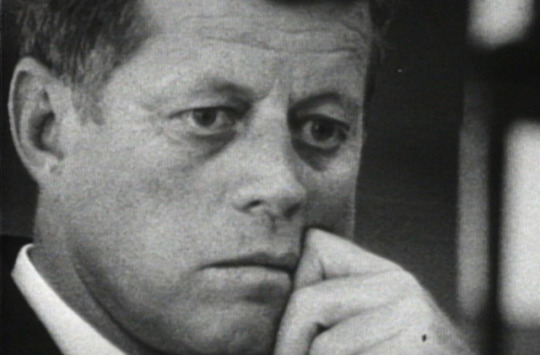
Per la prima volta avevamo la possibilità di entrare e uscire dagli edifici, di andare su e giù per le scale, di filmare nei taxi, dappertutto, e di avere il sonoro in presa diretta. Con Primary ho avuto per la prima volta la possibilità di utilizzare la nuova attrezzatura per le riprese e il montaggio, nonché le nuove idee, e tutto nello stesso tempo. Mi sono ritirato in un cantuccio e mi sono fatto piccolo piccolo, seduto in una grossa e comoda poltrona con la macchina da presa in grembo. Sono più che sicuro che non ha avuto la più pallida idea che stessi filmando. Primary è stato un successo, ma senza riuscire veramente in ciò che avevamo intenzione di fare, che era mostrare quanto accade realmente durante le elezioni.
#primary#leacock#d.a. pennebaker#al maysles#terence macartney-filgate#robert drew#documentire#kennedy#humphrey
1 note
·
View note
Text

The Cars in Your Life, 1960
8 notes
·
View notes
Text
Unsung Canadian Heroes: Police Officers
When young children bear witness to tragedy, we always tell them to look for the helpers. We want them to seek out the people who step forward, help out, and model acts of compassionate behavior. We want them to focus on those professionals whose job it is to maintain order, restore health, and sometimes perform rescue operations.
These people are unsung heroes. They’re all around us. Sometimes we see them, sometimes we don’t. Some heroes wear a uniform, like police officers, fire fighters, or ambulance workers. Some don’t, like mothers, teachers, and passersby who offer food to the homeless.
In this series, each post will focus on a different type of unsung Canadian hero. Today we’re looking at police officers. Given the nature of the work they do, a lot of these films call for viewer discretion.
Whistling Smith
Sergeant Bernie “Whistling” Smith, who passed away in 2012, was widely known as a tough cop with a big heart. He goes beyond the call of duty by not only maintaining order on Vancouver’s Eastside, but by actively trying to help the addicts, thieves, and prostitutes living in the area.
oehttps://https://ift.tt/2JPNEGS
Police
No matter the subject, filmmaker Terence Macartney-Filgate is a master at getting through the veneer to give us a glimpse of the truth. This time, he turns his lens on the Toronto metropolitan police force to show us what they’re dealing with day in and day out.
oehttps://www.nfb.ca/film/police/
Through a Blue Lens
Here are a group of seven policemen who take their jobs one step further by documenting the people on their beat to send a powerful message about drug abuse. By getting them to open up and speak on camera about their experiences, these officers are working to prevent addiction in the next generation.
oehttps://https://ift.tt/2vl9UW5
10-7 for Life
Meet Carol Banks, a Toronto officer who’s on the last two weeks of the job. Burnt out and at the end of her rope, Banks has opted to get off the force to salvage her peace of mind. Filmed by her sister, the film really gives you a sense of what these officers are up against.
oehttps://https://ift.tt/2JUufVo
Station 10
As we move from the streets of Toronto to the neighbourhoods of Montreal, we learn that regardless of location, police officers have their work cut out for them. This feature-length doc follows the life of police officers working at Montreal’s Station 10 in the early 1970s.
oehttps://https://ift.tt/2EUYXtw
The post Unsung Canadian Heroes: Police Officers appeared first on NFB/blog.
Unsung Canadian Heroes: Police Officers posted first on http://film-streamingsweb.blogspot.com
0 notes
Text
The Best NFB Films of the 1950s
With 3000+ films that you can stream for free, picking a starting point can be tricky!
Enjoy a (subjective) list of the 10 best NFB films from the 1950s!
A Chairy Tale
Follow our bedeviled protagonist (Claude Jutra) as he chases a chair with a mind of its own. All he wants is to sit down, but McLaren and Lambart’s lively animation results in anything but.
oehttps://www.nfb.ca/film/a_chairy_tale/
Blinkity Blank
Join a variety of lively figures as they frolic in Norman McLaren’s celluloid circus. The pioneering animator scratched his filmstrip by hand in this 1955 Cannes Palme d’Or winner for Short Film.
oehttps://www.nfb.ca/film/blinkity-blank
City of Gold
Narrated by Pierre Berton, the film juxtaposes still photographs of the freewheeling past with footage of Yukon at the height of the Klondike gold rush in the 1950s.
oehttps://www.nfb.ca/film/city_of_gold/
Glenn Gould – Off the Record
Join the Canadian concert pianist as he enjoys some R&R at his lakeside cottage and enjoy a privileged view of his life outside the public eye. Watch the continuation: Glenn Gould – On the Record.
oehttps://www.nfb.ca/film/glenn_gould_off_record
Neighbours
Meet a pair of pals whose love-hate relationship comes to blows over a simple backyard flower. Norman McLaren used stop-motion techniques to animate live actors in this ingenious little film.
oehttps://www.nfb.ca/film/neighbours_voisins
Royal Journey
Tag along with Princess Elizabeth and the Duke of Edinburgh on their 1951 visit to Canada as they cross the country from coast to coast, experiencing Canadian art, culture and landscape.
oehttps://www.nfb.ca/film/royal_journey
The Back-breaking Leaf
Learn how tobacco crops are harvested in southwestern Ontario. Terence Macartney-Filgate’s short film portrays the hardship involved in this back-breaking work.
oehttps://www.nfb.ca/film/the_back-breaking_leaf/
The Living Stone
This short focuses on an old legend about the carving of the image of a sea spirit to bring food to a hungry camp.
oehttps://www.nfb.ca/film/living-stone/
The Stratford Adventure
Enjoy this Oscar-nominated Morten Parker short that depicts how the little town of Stratford, Ontario created its own Shakespearean theatre and festival.
oehttps://www.nfb.ca/film/stratford_adventure/
The post The Best NFB Films of the 1950s appeared first on NFB/blog.
The Best NFB Films of the 1950s posted first on http://ift.tt/2sCUYNt
0 notes